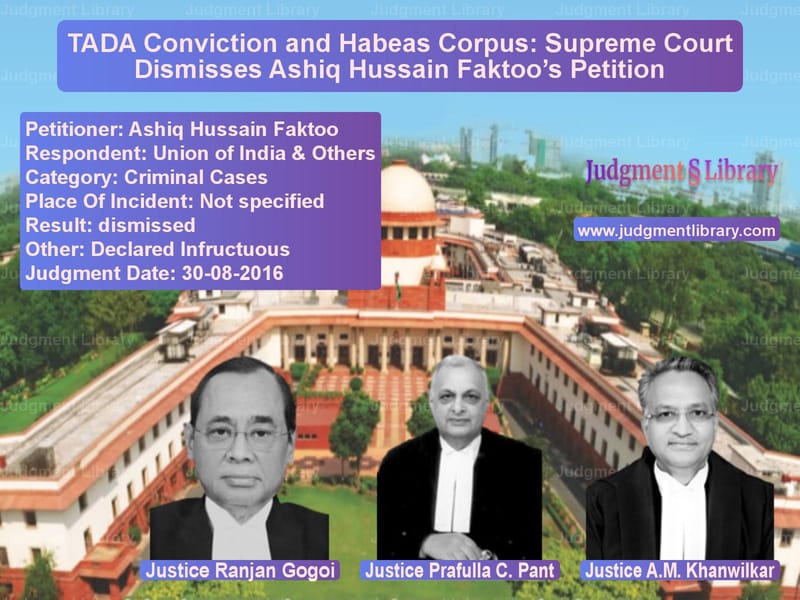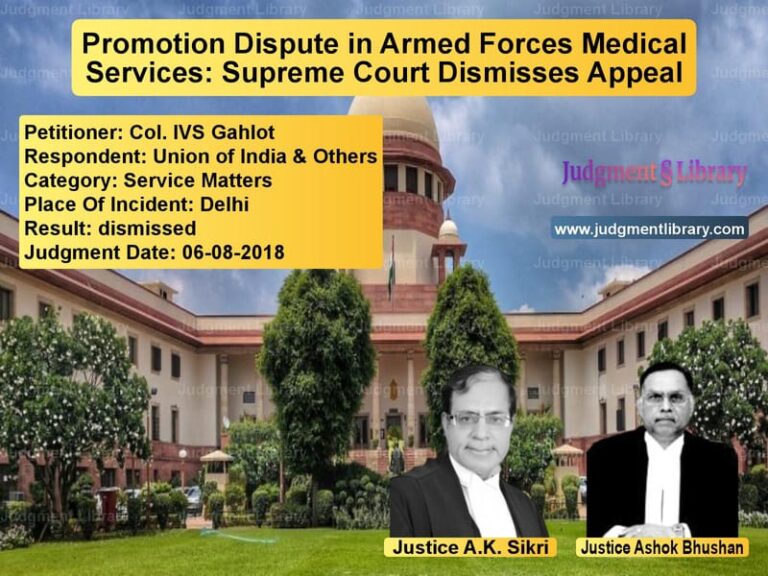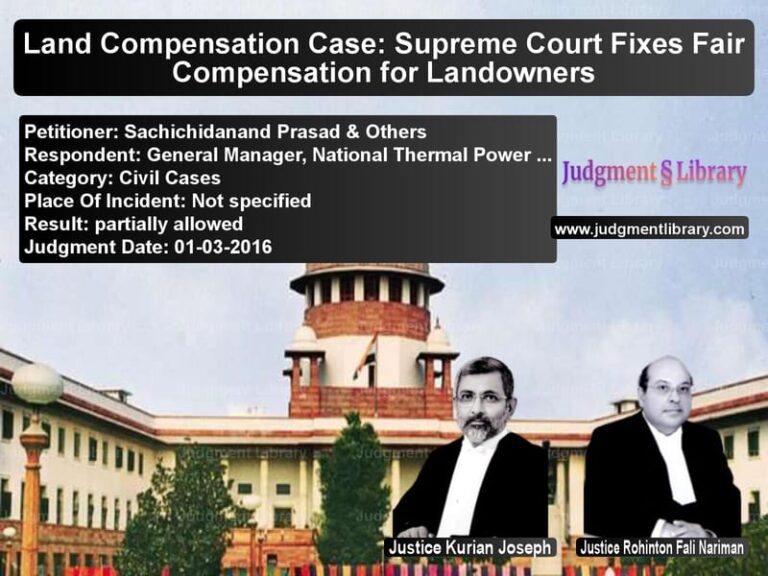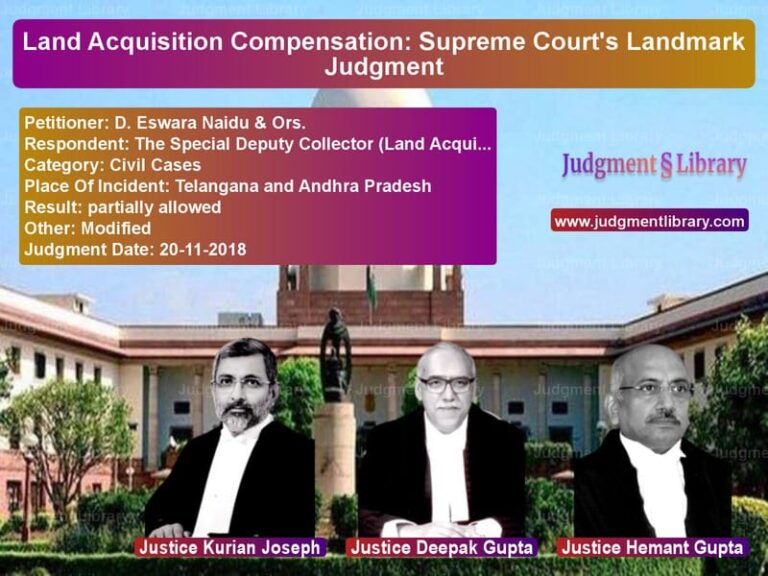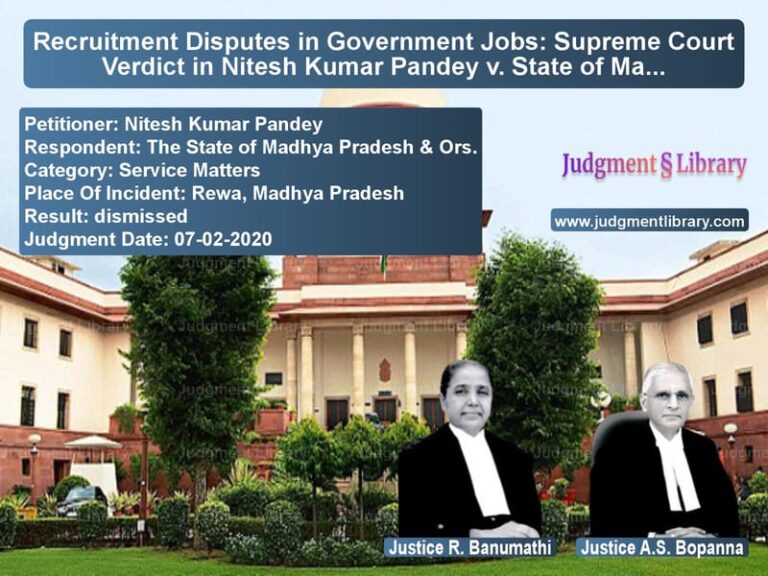TADA Conviction and Habeas Corpus: Supreme Court Dismisses Ashiq Hussain Faktoo’s Petition
The Supreme Court of India, in the case of Ashiq Hussain Faktoo vs. Union of India & Others, addressed a writ petition filed under Article 32 of the Indian Constitution. The petitioner, Ashiq Hussain Faktoo, had been convicted under the Terrorist and Disruptive Activities (Prevention) Act, 1987 (TADA) and Section 302 read with Section 120B of the Indian Penal Code (IPC). He was sentenced to life imprisonment. Through this petition, he sought his release, arguing that his conviction was erroneous and based on inadmissible evidence.
Background of the Case
The petitioner, Ashiq Hussain Faktoo, was convicted by a judgment dated January 30, 2003, in Criminal Appeal No. 889 of 2001. The Supreme Court had already dismissed review petitions and a curative petition filed by the co-accused. The petitioner then filed a writ petition seeking a writ of habeas corpus for his release.
Legal Issues Before the Supreme Court
The Supreme Court was required to decide:
- Whether the petitioner could challenge his conviction through a writ petition under Article 32 after exhausting other legal remedies.
- Whether the conviction under TADA was valid and supported by evidence.
- Whether the doctrine of ex debito justitiae (correction of manifest injustice) applied to this case.
Arguments by the Petitioner
The petitioner, Ashiq Hussain Faktoo, presented the following arguments:
- His conviction was primarily based on a confession that did not meet legal requirements.
- The confession was recorded while he was in police custody, making it inadmissible under Section 26 of the Indian Evidence Act, 1872.
- There was no corroborative evidence to support his conviction under TADA.
- The confession was obtained in violation of Rule 15 of the TADA Rules and the Supreme Court’s guidelines in Kartar Singh vs. State of Punjab (1994).
- His continued detention violated fundamental rights, and the Court should exercise its power under ex debito justitiae to correct the miscarriage of justice.
Arguments by the Respondents
The Union of India, represented by senior counsel, countered the petitioner’s claims with the following arguments:
- The petition was not maintainable under Article 32 because the petitioner had already exhausted all legal remedies, including review and curative petitions.
- The Supreme Court had upheld his conviction in 2003 after considering all legal and factual aspects.
- The petitioner was attempting to reopen a case that had already been adjudicated at multiple levels.
- Under the ruling in Rupa Ashok Hurra vs. Ashok Hurra, a review of a concluded case could be allowed only in exceptional circumstances, such as violation of natural justice, which was not applicable in this case.
- The confession met all legal requirements under Section 15 of the TADA Act, which allows confessions made to a senior police officer to be admissible.
Supreme Court’s Observations
The Supreme Court thoroughly examined the legal issues raised by both parties and made the following key observations:
“The writ petition seeks interference with the order of conviction and the sentence imposed on the petitioner by this Court by its judgment and order dated 30th January 2003. However, review petitions and curative petitions have already been dismissed.”
The Court further held:
“Open Court hearing of review petitions in terms of the judgment of this Court in Mohd. Arif alias Ashfaq vs. Registrar, Supreme Court of India is available as of right only in death sentence cases.”
On the issue of whether the principle of ex debito justitiae applied, the Court ruled:
“The doctrine of ex debito justitiae would apply only in cases where the order was passed without notice or where public confidence in the justice delivery system is eroded.”
Final Judgment
The Supreme Court ruled that the writ petition was not maintainable and dismissed it with the following findings:
- The petitioner had already exhausted legal remedies through review and curative petitions, making further challenges impermissible.
- The judgment convicting the petitioner was passed after due consideration of all legal principles.
- There was no violation of natural justice that would justify reconsideration of the conviction.
- The petition did not fall within the narrow exceptions under which post-conviction relief could be granted.
Implications of the Judgment
This case sets significant legal precedents regarding post-conviction relief and the finality of judgments:
- Limited Scope for Habeas Corpus in Convictions: The ruling reaffirms that a writ of habeas corpus cannot be used to challenge a conviction when all legal remedies have been exhausted.
- Finality of Supreme Court Judgments: The decision underscores that once a review and curative petition are dismissed, the judgment attains finality.
- Application of Ex Debito Justitiae: The ruling clarifies that this principle applies only in cases of procedural injustice, not where a convicted individual merely seeks another review.
- Use of Confession under TADA: The judgment upholds the admissibility of confessions recorded under Section 15 of the TADA Act.
Conclusion
The Supreme Court’s decision in Ashiq Hussain Faktoo vs. Union of India reinforces the importance of finality in judicial decisions. The Court rejected the petitioner’s attempt to reopen a settled case and clarified the limited scope of relief under Article 32 of the Constitution. This ruling serves as a precedent for future cases, ensuring that post-conviction relief is granted only in exceptional circumstances where procedural injustice can be clearly established.
Don’t miss out on the full details! Download the complete judgment in PDF format below and gain valuable insights instantly!
Download Judgment: Ashiq Hussain Faktoo vs Union of India & Oth Supreme Court of India Judgment Dated 30-08-2016-1741878591572.pdf
Direct Downlaod Judgment: Direct downlaod this Judgment
See all petitions in Terrorist Activities
See all petitions in Custodial Deaths and Police Misconduct
See all petitions in Extortion and Blackmail
See all petitions in Judgment by Ranjan Gogoi
See all petitions in Judgment by Prafulla C. Pant
See all petitions in Judgment by A M Khanwilkar
See all petitions in dismissed
See all petitions in Declared Infructuous
See all petitions in supreme court of India judgments August 2016
See all petitions in 2016 judgments
See all posts in Criminal Cases Category
See all allowed petitions in Criminal Cases Category
See all Dismissed petitions in Criminal Cases Category
See all partially allowed petitions in Criminal Cases Category

